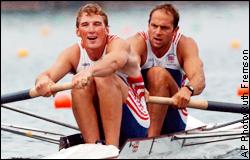



|

|
Tuesday, September 19
Redgrave says he's better than ever
Associated Press
HENLEY-ON-THAMES, England -- Four years ago, Steve Redgrave
climbed out of his boat after winning his fourth straight Olympic
gold medal and said:
"If anybody sees me go anywhere near a boat, they have my
permission to shoot me."
Without a shot being fired, the world's most successful rower is
back on the water. The 38-year-old Englishman will try to become
just the second Olympian to win gold in five consecutive games --
winter or summer.
"The statement I made and the buildup to it was very intense,
and I felt that was going to be it," Redgrave said. "I didn't
want to carry on anymore. But even two or three days afterwards I
started thinking the Sydney Olympics would be a tremendous games."
|  | | Steve Redgrave, right, isn't commenting on whether he'll compete after Sydney. |
Redgrave and teammate Matthew Pinsent won the coxless pairs in
1996 to bring Britain its only gold medal in Atlanta.
Now they're the heart of Britain's coxless four and, until last
month, the so-called "Fab Four" were the Olympic favorites. But
in a World Cup race in Switzerland -- the final Olympic tuneup -- the
three-time defending world champions finished fourth behind Italy,
New Zealand and Australia.
Redgrave, diagnosed with diabetes shortly after his comeback,
suddenly looks beatable. But to suggest he's the crew's weak link
draws a hawklike glare as his wrinkled forehead grows even more
deeply etched.
"No, I don't think I am as good as I was in the last two
Olympics," he said, pausing for emphasis. "I'm better."
The weight of expectation is enormous in a country that invented
soccer, cricket and rugby and is now often beaten in all of them.
Rowing is also quintessentially English, illustrated by the
nationally televised Oxford vs. Cambridge Boat Race each spring and
summer's high-society Henley Regatta.
"We are aware of the situation of the country and not being
that successful," Redgrave said. "And we're still one of the
events that still do very well."
Redgrave injects himself with insulin before training and racing
but says, "The way I go about things is hardly any different than
before."
"I've won two world championships being a diabetic. We're
racing the same people we were at last year's world championships.
I don't see any problem with that."
Redgrave has nine world championship gold medals. If he wins a
fifth consecutive Olympic gold in the final Sept. 23, he'll become
only the second athlete in history to have done it. Hungarian
fencer Aladar Gerevich holds the record with gold medals at six
straight games, from 1932 to 1960.
"I don't really look at it as winning a fifth gold. I'm looking
to win a gold I haven't got," he said between training sessions on
the Thames an hour west of London.
"Four years of your life go into trying to win one. Certainly
this one is going to have as much focus -- hopefully once we've got
it around our neck -- as they others have."
Whenever questions about Redgrave's age come up, he is defended
by his three younger teammates -- Pinsent, 29, Tim Foster, 30, James
Cracknell, 28 -- and German coach Juergen Grobler.
"The difference is he likes different music than we do," said
Pinsent, a two-time Olympic gold medalist himself.
Opposing teams, however, recognize the vulnerability.
"Redgrave is the most successful rower the world has ever
seen," said Ben Dodwell, a member of Australia's coxless four. "I
have tremendous respect for him. ... But he's just another
competitor."
Redgrave won gold in the coxed four in Los Angeles in 1984,
coxless pairs with Andy Holmes in Seoul in 1988, and with Pinsent
in coxless pairs in Barcelona and Atlanta.
The unexpected loss last month was encouraging for Britain's six
main rivals -- Italy, New Zealand, Australia, Norway, France and the
United States -- and damaged Britain's momentum.
"You would never go out of your way in an Olympic buildup
before the games and want to lose," Pinsent said. "That's not
really the 'A' plan, is it? But having been dealt that hand ... you
then say how do you make the best out of it."
Asked if he will retire after Sydney -- and stick to it --
Redgrave smiled.
"We'll see," he said. "After the statement I made last time
nobody's going to believe me one way or the other."
|  | |
|







